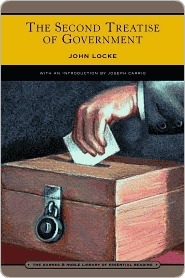4 of 5 stars ****
John Locke is a most fundamental influence on the United States of America's foundation. His worldview, logical mind, and sense of justice for men and women in society pave the way for our founding fathers. The reading can be challenging because of his style but the gist is clear once read.
Locke introduces the reader to the reasoning behind the choices one makes in becoming a member of society. All societies differ in many ways but the source of power in a society may be abusive to its people or unfair in its attempt to maintain power.
Locke then proceeds to suggest something rare; a society that is for the people who live and work within its laws in a harmonious fashion. He is a proponent of an individual's right to property, fair judgment, and protection of his life from anyone or anything that tries to impose their will over his to further their own power. He believes that a commoner should yield to an authority when authority is legislating from a mutual understanding that protects everyone. Locke also points out that if the authority forces its power over a commoner for personal gain, then the righteous one is the commoner and is justified in rebelling against such authority.
Locke's Second Treatise of Government concludes that any power given up to authorities who remain in power and arrange for successors to their political positions cause the people, communities, and commonwealth to forfeit their power. For this reason, temporary positions of power allow a society to right itself once it diverts from its original course because the people can make the corrections as they see fit.

No comments:
Post a Comment